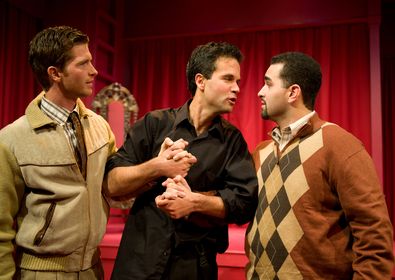One of the perks of my profession is that I get to sit in on a vast array of different classes. Some of these are my own classes designed to be taught to myself and my colleagues, some are classes which I am assisting in some capacity and thereby are designed to be taught to those slightly lower on the intellectual hierarchy.
And because I do get to sit in on this wide array of classes, when I notice a pattern it’s generally something fairly universally applicable (as universally applicable as anything truly can be).
So, for the past few weeks, a pattern has come to my attention and it’s really beginning to sit funny under my skin. In all of my classes, at least once but generally multiple times a class session, Hamlet has been brought up not just as the iconographic English-language play, but the iconographic play of the entire modern Western theatre canon.
By “sit funny” I don’t mean “sit wrongly” or “feel badly”, I just mean that it’s come up so very frequently that I can’t help but be astounded by it. Obviously my man Will is a deeply influential force in my life, but the fact that he’s mentioned so often in these classes implies something that I’ve always assumed, but have only rarely paused to examine deeply.
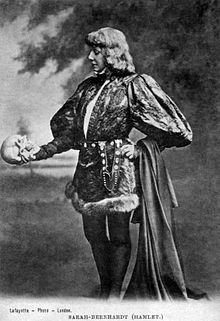
iconic shot of Sarah Bernhardt as Hamlet
In the paper I am currently working on for ASTR, I argue that the creation of Hamlet as an icon is deeply wrapped in the creation of David Garrick’s career. David Garrick was eighteenth century London’s (arguably) most famous actor, and if not actor then certainly most famous Shakespearean. Garrick had a penchant for Hamlet (and, for that matter, Hamlet) and had many professional interactions with the role and the text that worked to cement both in the eighteenth century consciousness (I’m being purposefully vague here, while I’m happy to bat around general concepts, I’m not comfortable publishing my research notes on the internet). In my opinion, this is truly the beginning of the ruff-wearing, skull-holding, brooding prince as an icon of the theatre.
The continuance of this icon and its permeation into the college classroom tells me several things:
1) It is a fairly wide-reaching trope. The fact that a professor, striving to explain a concept to a roomful of undergrads, can reach for Hamlet as a cardinal example and expect the entire room to understand what he is saying, uncovers certain societal expectations of the people sitting in that classroom. Both undergraduate classes which I’m sitting in on are taught via the theatre department, but only one of them is an “upper-level” course (i.e.: has prerequisites). Thereby, while these students are expected to have a passing interest in theatre, they are not all expected to have proficiency with theatre. Thereby, the expectation that the modern, educated young person will understand Hamlet as an icon is an expectation that can be carried into the real world. Educated people know Hamlet, even if they aren’t educated in the theatre per say.
2) It is an accepted trope. Not once have any of the students disputed the idea that Hamlet is a go-to for archetypical modern Western theatre. In fact, utilizing Shakespeare (and, particularly, Hamlet) as an authority is a tradition almost as old as Shakespeare himself (another topic I’m grappling with in my paper, but this is going to become its own project imminently).
3) It is a wide-ranging trope. Again, I live in the Theatre Department, so that certainly limits my sample size. Outside of that limit, I feel as though I’ve heard the trope repeated enough that I can say with some surety that it’s not just theatre people who do this. How often have we seen the aforementioned image in advertising, cartoons, popular culture? The ruff and skull image seem to be shorthand for “theatre” just as “Band-Aid” is shorthand for “sticky bandage with sterile pad for small wound”.
ll of this leads me to the conclusion that the Hamlet connection is a true societal meme;
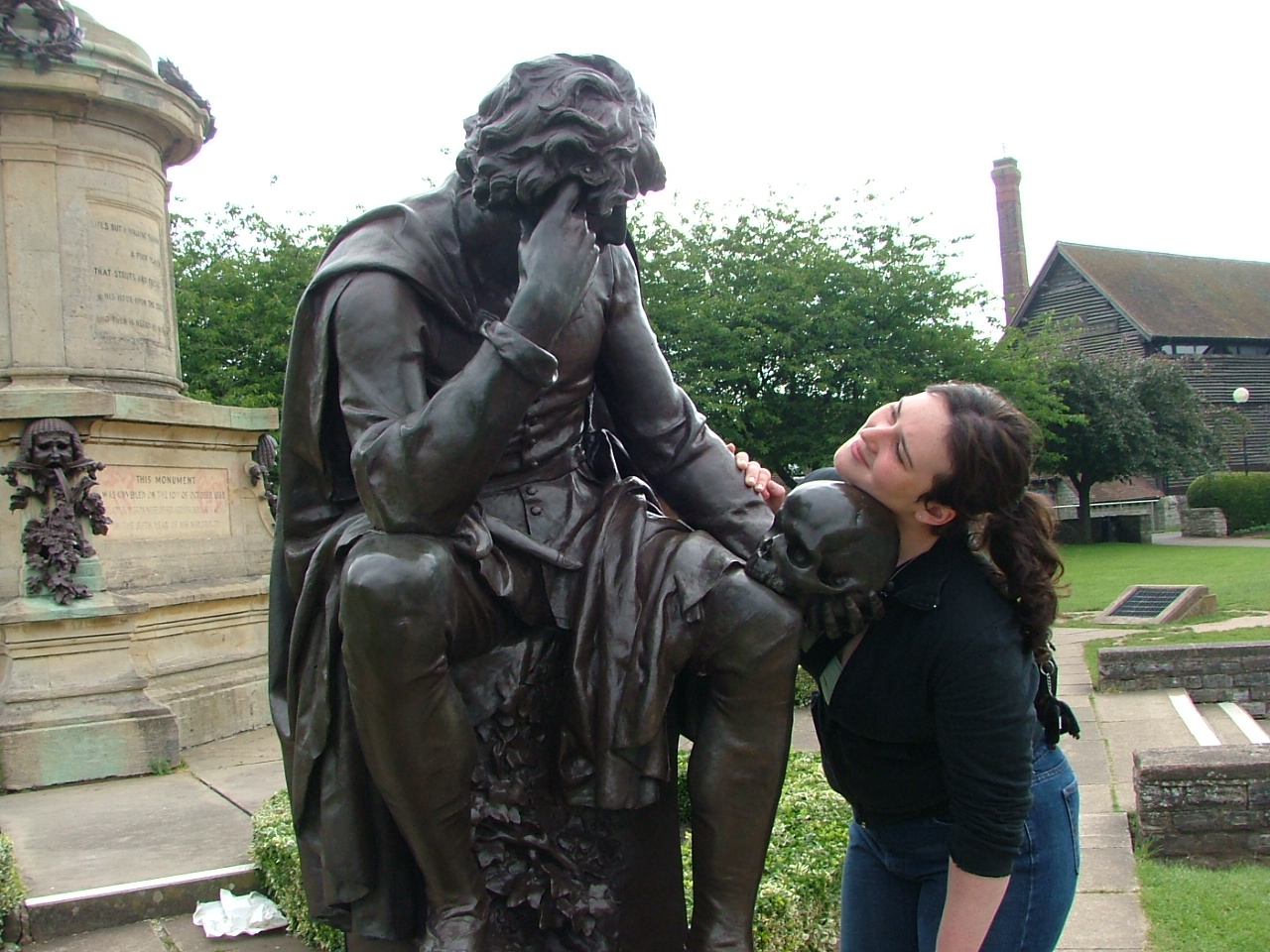
Hanging with Hamlet in Stratford-upon-Avon
passed down from one generation to another in a self-perpetuating state of self-referentiality. I plan to keep an eye on the Hamlet meme in hopes that it will spark something deeper, but for the moment my brain space has only enough room for pattern recognition.
So keep an eye out. I’m thinking of making Hamlet-spotting a sport.
(Rosalind update: As You is looking great! We go into tech Sunday and open for an invited dress next Thursday before real opening night Friday. EXCITED!)

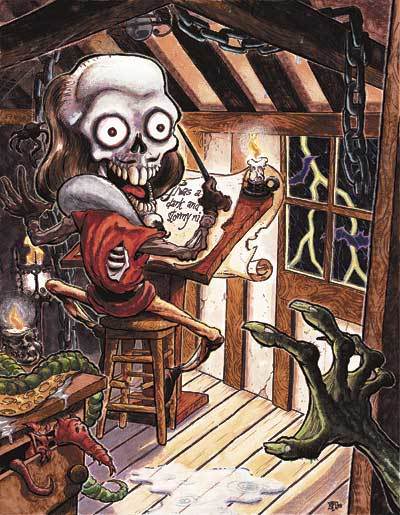
 This also complicates Hamlet’s killing of Polonius, as when he hears a rustling in the curtains of his mother’s bedchamber he could potentially believe it to be an undead foe and, thereby, shoot said foe in the head before it leapt out to attack. Polonius becomes an unfortunate victim of the country’s political strife as opposed to the sacrificial lamb of Hamlet’s madness.
This also complicates Hamlet’s killing of Polonius, as when he hears a rustling in the curtains of his mother’s bedchamber he could potentially believe it to be an undead foe and, thereby, shoot said foe in the head before it leapt out to attack. Polonius becomes an unfortunate victim of the country’s political strife as opposed to the sacrificial lamb of Hamlet’s madness.
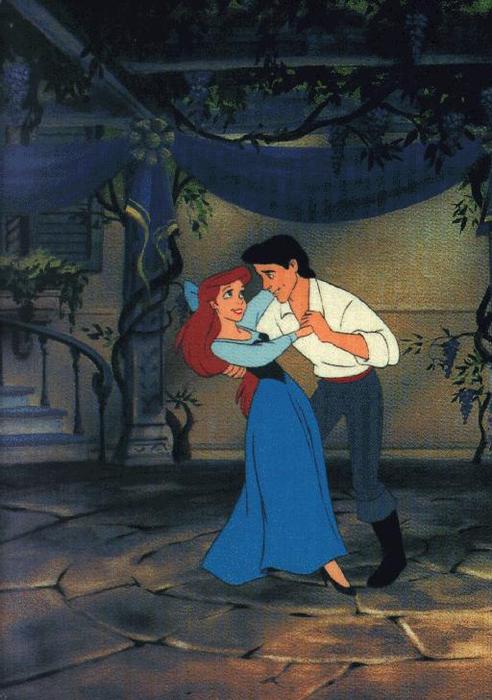 best and sacrilegious at worst. At the same time, we well and truly wondered if this whole “marry a prince” thing wasn’t even more of a sham in his case than usual. I mean, after all, Ariel is the most gullible and least savvy of all the Disney princesses. It would be pretty easy to convince her that one was a prince with some impressive architecture, a personalized statue, and a French chef.
best and sacrilegious at worst. At the same time, we well and truly wondered if this whole “marry a prince” thing wasn’t even more of a sham in his case than usual. I mean, after all, Ariel is the most gullible and least savvy of all the Disney princesses. It would be pretty easy to convince her that one was a prince with some impressive architecture, a personalized statue, and a French chef. But this doesn’t take into account the ending of the fairy tale. Yes, of course, in the Disney version everyone lives happily ever after blah blah blah. But if you read the Hans Christian Anderson tale, things conclude a little differently. In the original tale, the Little Mermaid becomes human because she is told that humans have souls and can thus live forever even after they die. Mermaids, on the other hand, disintegrate into sea foam upon death. The nameless Little Mermaid strives to become human so that she too may obtain eternal life instead of waft into watery nothings. She buys a potion from the Sea Witch which will give her legs and make her dance unlike any human has ever danced, but will also make her feel as though with each step she is treading upon swords. In addition, she may only become truly human by marrying the Prince and thus obtaining half of his soul. If she fails to do this, then the morning after the Prince marries someone else the mermaid will melt into sea foam anyway.
But this doesn’t take into account the ending of the fairy tale. Yes, of course, in the Disney version everyone lives happily ever after blah blah blah. But if you read the Hans Christian Anderson tale, things conclude a little differently. In the original tale, the Little Mermaid becomes human because she is told that humans have souls and can thus live forever even after they die. Mermaids, on the other hand, disintegrate into sea foam upon death. The nameless Little Mermaid strives to become human so that she too may obtain eternal life instead of waft into watery nothings. She buys a potion from the Sea Witch which will give her legs and make her dance unlike any human has ever danced, but will also make her feel as though with each step she is treading upon swords. In addition, she may only become truly human by marrying the Prince and thus obtaining half of his soul. If she fails to do this, then the morning after the Prince marries someone else the mermaid will melt into sea foam anyway.